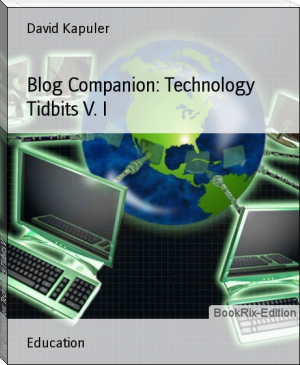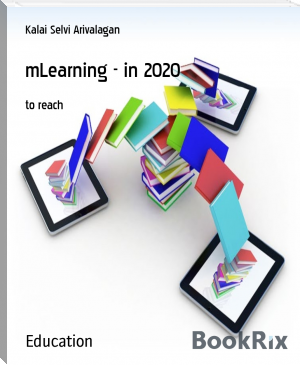INNOVATIONS IN SCIENCE, TECHNOLOGY AND MATHEMATICS EDUCATION IN NIGERIA by Ebele C. Okigbo, Nneka R. Nnorom, Ernest O. Onwukwe (the ebook reader .txt) 📖

- Author: Ebele C. Okigbo, Nneka R. Nnorom, Ernest O. Onwukwe
Book online «INNOVATIONS IN SCIENCE, TECHNOLOGY AND MATHEMATICS EDUCATION IN NIGERIA by Ebele C. Okigbo, Nneka R. Nnorom, Ernest O. Onwukwe (the ebook reader .txt) 📖». Author Ebele C. Okigbo, Nneka R. Nnorom, Ernest O. Onwukwe
3.42
0.81
Agreed
ICT helps to increase the cognitive and technological skills of pupils when used to teach them mathematics.
3.35
0.49
Agreed
Pupils/teachers interact and share ideas with the use of ICT devices or tools.
3.37
0.52
Agreed
ICT helps pupils to have first-hand experience
3.35
0.70
Agreed
Pupils develop self-confidence when ICT is used to teach them mathematics.
3.38
0.46
Agreed
The use of ICT helps to reduce stress and workload for teachers and pupils.
3.40
0.22
Agreed
The use of ICT enables pupils to improve on their creative and imaginative skill.
3.40
0.83
Agreed
ICT helps teachers and pupils in solving problems easily
3.33
0.74
Agreed
Cluster Mean
3.34
0.57
Agreed
Table 1 shows the mean scores of primary school teacher’s perceptions on the importance of using ICT to teach mathematics to primary school pupils in Awka South L.G.A. The respondents agreed that all the items so stated are the importance of using ICT to teach mathematics to primary school pupils. This is because the mean scores of all the items are above 2.50. The standard deviation which fallsbetween0.22 to 0.83 shows the homogeneity of respondent’s responses.
Research Question 2: What are the competency levels of primary school teachers in the use of ICT in teaching mathematics to pupils in Awka South L.G.A?
Table 2: Mean Rating of Primary School Teachers on the Competency Levels in the Use ICT to Teach Mathematics to Primary School Pupils in Awka South L.G.A.
S/N
Items
Mean ()
SD
Decision
Teachers use CD's, DVD's to teach pupils mathematics in order to make their work easier.
1.97
0.92
Disagreed
Teachers use and understand the workings of computers effectively.
2.20
0.47
Disagreed
Teachers can start up and shut down a computer system effectively
2.36
0.58
Disagreed
Teachers use the knowledge gotten from applets to teach mathematics.
2.09
0.76
Disagreed
Teachers make use of projectors to teach mathematics more effectively.
2.14
0.39
Disagreed
Television sets are used by teachers to teach pupils mathematics.
1.99
0.45
Disagreed
Teachers make use of graphic calculators to teach pupils how to draw graphs.
1.99
0.81
Disagreed
Teachers use dynamic geometry software programs to teach pupils shapes for better understanding & clarity.
1.97
0.50
Disagreed
Teachers can use flash drives/diskettes/CD to save or store mathematical concept for easy retrieval and easy access.
2.01
0.32
Disagreed
Teachers can present their teachings in slides in such a way that pupils will follow it systematically.
2.22
0.73
Disagreed
Cluster Mean
2.09
0.59
Disagreed
Table 2 shows the competency level of teachers in the use of ICT to teach mathematics to primary school pupils in Awka South LGA. Items in number 11, 12, 13, 14, 15, 16,17,18,19, and 20 scored 1.97, 2.20, 2.36, 2.09, 2.14, 1.99, 1.99, 1.97, 2.01, and 2.22 respectively which are below the decision mean of 2.50. This shows that teachers in primary schools are not competent enough in using ICT to teach pupils mathematics in the classroom. The standard deviation which falls between 0.32 to 0.92 shows the homogeneity of respondent’s responses.
Discussion
The findings in Table 1 revealed the importance of using ICT to teach mathematics to primary school pupils in Awka-South Local Government Area to include that ICT enhances co-operative learning among pupils, ICT helps pupils to have firsthand experience and helps to reduce stress and workload for teachers and pupils among others. This finding is in agreement with Babalola, Ibitoye and Efuntayo (2006) who reported that the importance of using ICT devices to teach mathematics determine the academic progress of children, empowered them with the problem solving skill and also they can achieve this with the contribution or support by parents, curriculum planners, school administrators and the society at large.
Findings in Table 2 revealed that teacher’s in primary schools are not competent enough in using ICT to teach pupils mathematics in the classroom. This is in accordance with Ezeugbor (2008) who noted that teachers' low competence level in basic computer knowledge affect their ability in harnessing ICT gains in education. This implies that most primary school teachers are still using traditional method of teaching Mathematics. This supports the view of Obumneke-Okeke and Okoli (2017) that the limited use of ICT by teachers was not due to lake of facilities but due to lack of knowledge and skills in its application or applicability hence, teachers are unable to exploit the numerous gains that abound in the use of ICT in teaching.
Conclusion
Based on the findings of the study, the researchers observed that primary school teachers scarcely apply ICT to diversify their lesson contents when teaching Mathematics. In addition, primary school teachers lack the requisite instructional competencies to integrate ICT in their instructional delivery. With these in mind, the study concluded that, the over reliance of primary school teachers on traditional method of teaching Mathematics will not in still creative thinking and problem solving abilities among pupils in handling mathematical problems in primary schools.
Recommendations
The following recommendations were made based on the findings:
Government should organize Conferences, workshops and seminars for primary school teachers in order for them to improve their knowledge and application of Information and Communication Technology in teaching Mathematics.
Government should see to the recruitment of ICT oriented teachers who will be able to integrate ICT resources in teaching Mathematics in primary schools
Education authorities of primary schools should make computer software for research and instructional use available for teachers.
References
Anaduaka, U.S., &Okafor, C.F. (2013). “Nigerian school children and mathematics phobia: How the mathematics teacher can help”. American Journal of Educational Research,1(7);247 – 251
Ayhan, M.A. (2011). The effect of activity-based mathematics instruction on 8th grade students’ academic success. Unpublished master’s thesis, Institute of Educational Sciences, Başkent University
Babalola, E., Ibitoye, R. &Efuntayo, A.(2006). The relationship between teachers access to ICT and student academic achievement. Journal of Education Studies,1(1); 208-217.
Burke, C. (2007). Inspiring spaces: creating creative classrooms. Curriculum Briefing, 5(2); 35-39
Des Hewitt, D,& Tarrant, S. (2015). Innovative Teaching and Learning in Primary Schools. London: SAGE Publications Ltd
Eke, N. & Nweke, P. (2010). Appraising the relationship between ICT usage and integration and the standard of teacher education programs in developing economy. International Journal of education and Development, 2(3) 70-85.
Ezeugbor, C.O. (2008).Information and communication technology (ICT) competence level of Nigeria tertiary institution teachers as challenges to harnessing the gains in education. In Nworgu, B .. G. (Ed), Education in the information age: Global Challenges and enhancement strategies. Nsukka: University Trust Publishers.
Federal Republic of Nigeria (2013).National Policy on Education. Lagos: NERCDC Press.
Golji, G. G., & Dangpe, A. K. D. (2016).Activity-based learning strategies (ABLS) as best practice for secondary mathematics teaching and learning. International Advanced Journal of Teaching and Learning, 2(9); 106-116.
Gouba, L. (2008). The importance of Mathematics in everyday life. South Africa: Africa institute for Mathematical Services, Muizenberg.
Kathryn, D. (2010). Academic performance achievement. Retrieved June 14, 2011, from http://www.nichgy.org.
Norman, F.O. (2011). Meeting the educational needs of all students. Office Education, North American Division. Seventh Day Adventists Schools.
Nzewi, U. (2009).Utilization of ICT in Teaching and hearing.In U.M.O., vowi (Ed).Curriculum Theory and Practice. Nigeria: CON.
Obumneke-Okeke, I.M., &Okoli, I.A (2017).Availability and utilization of ICT in Early Childhood Education in Orumba South LGA of Anambra State. Unizik Journal of Education Graduates, 4(1); 1-11.
Pei-Shi, W. (2012). The effect of learning styles on learning strategy use by EFL learners. Journal of Social Sciences, 8(2); 230-234.
Scortt, (2012).Academic performance of in-school children. Retrieved July 15, 2014 from
http://www.ehow.com/about_6398585_meaning-academic
E-LABORATORY IN SCIENCE TEACHING AND LEARNING
IN DEVELOPING COUNTRIES
Dr. John B. Moses
Abstract
This paper examined the use of e-laboratory in science teaching and learning in developing countries. No science subject can be effectively taught without the use of well-equipped laboratories. The paper indicated that most secondary Schools do not have science laboratories, therefore can depend on e-laboratories, which is relatively affordable to the schools. The paper also examined corruption as a factor behind the problem of lack of laboratories in secondary schools in some developing countries. The paper looked at e-laboratory strategy as a way of improvisation, where the real laboratory is not available. It was seen as an innovative way of science teaching and learning, where science laboratory could be found in the hands of the teachers as well as the learners. It was recommended that government should have the political will to establish separate laboratories for each of the science subjects in the existing schools. Also in establishing new schools, laboratories should first be provided before such schools are established.
Keywords: Developing countries, e-laboratory, science, teaching and learning
Introduction
The use of a well-equipped laboratory in science teaching is inevitable in any of the science subjects or disciplines. The teaching of science may be practically impossible without the use of a well-equipped science laboratory. The emphasis always is that each of the science subjects must have a separate laboratory, such as chemistry laboratory, biology laboratory and physics laboratory just to mention the basic science subjects. But the practice in most of the schools in African countries including Nigeria is the use of a general laboratory for all the science subjects especially in the rural areas. This is the case for the senior secondary schools only. For the primary schools, there are no laboratories at all, although some equipment are kept in store rooms or sometimes in the classroom (Akpan, 2012).
The provision of adequate laboratories for each of the science subjects has been a major challenge in the teaching of science in secondary schools. This is seen as one of the major problems that has led to the poor performance of science students in science subjects in external examinations over the years in many research finding (Danjuma 2006, Akpan, 2008, Moses 2012, Akpan 2012).
There are very few schools that have separate laboratories, and even the laboratories that are said to be available are not adequately equipped. This is a major problem of most African countries due to its capital intensive nature. Even though the setting up of a laboratory is capital intensive, if there is a political will on the part of the government and even corporate bodies and donor agencies, it can be done.
Over the years, it is difficult for most African countries to meet up the UNESCO bench mark of 20% budgetary provision for the education sector for their yearly budgets. Since the budget allocation to education is very low it will be very hard for the government to provide adequate laboratories for all schools in their nations’ school systems, therefore making the carrying out of practicals in the laboratory very difficult.
Another major reason why most secondary schools lack science laboratories in Africa is due to corruption. It is on record that most African countries are corrupt; therefore making it very difficult for them to do the right thing that is needful. Even if monies are released, one individual may decide to embezzle the money, or even if the contractor does the job, may decide to do a sub-standard job. These have led to depriving the students from having good practical science classes.
In other to solve this problem science teachers, educators and scholars have come with, some innovative methods such as improvisation of science equipment and materials. This is to, at least make the students have a feel of what practical teaching of science in the laboratory is all about.
Instructional materials in science teaching play a vital role in the implementation of the science curriculum. It is one of the factors affecting the performance of the students in science. They are aids which the teacher uses to make the teaching and learning process of science much easier. These materials could be;
print, such as books peppers, journals magazines, pamphlets, handouts etc
visual, such as photographs, charts, slides etc
audio, such as radio, tapes recording, recording players etc
audio-visuals, such as films, televisions, videos, multi-media.
static displays, such as chalk boards, felt boards magnetic boards
electronic, such as computers, e-mail, internet, you-tube, whatsapp, facebook etc.
Most schools in developing countries do not these instructional materials. This was what led to the use of improvisation as a strategy for science teaching in the schools.
What is improvisation?
Improvisation is the art of constructing an alternative material, that will serve the purpose of the real material, where the real materials is not available. Mohammed (2001) defines improvisation as the act of using alternative materials or equipment obtained from local environment, designed or constructed by the teacher, or with the local artisans to facilitate instructions. Also, Olayiwola (2000) state that, it is the art of providing alternative or next to real thing when the real thing is not available or very difficult to get.
It is common knowledge that this task is not an easy
 The desire to acquire knowledge about the surrounding world and human society is quite natural and understandable for a person. Life is so developed that an uneducated person will never occupy a high position in any field. Humanity in its mass, and each person individually, develops objectively, regardless of certain life circumstances and obstacles, but with different intensity. The speed of development depends on the quality of training.
The desire to acquire knowledge about the surrounding world and human society is quite natural and understandable for a person. Life is so developed that an uneducated person will never occupy a high position in any field. Humanity in its mass, and each person individually, develops objectively, regardless of certain life circumstances and obstacles, but with different intensity. The speed of development depends on the quality of training.




Comments (0)